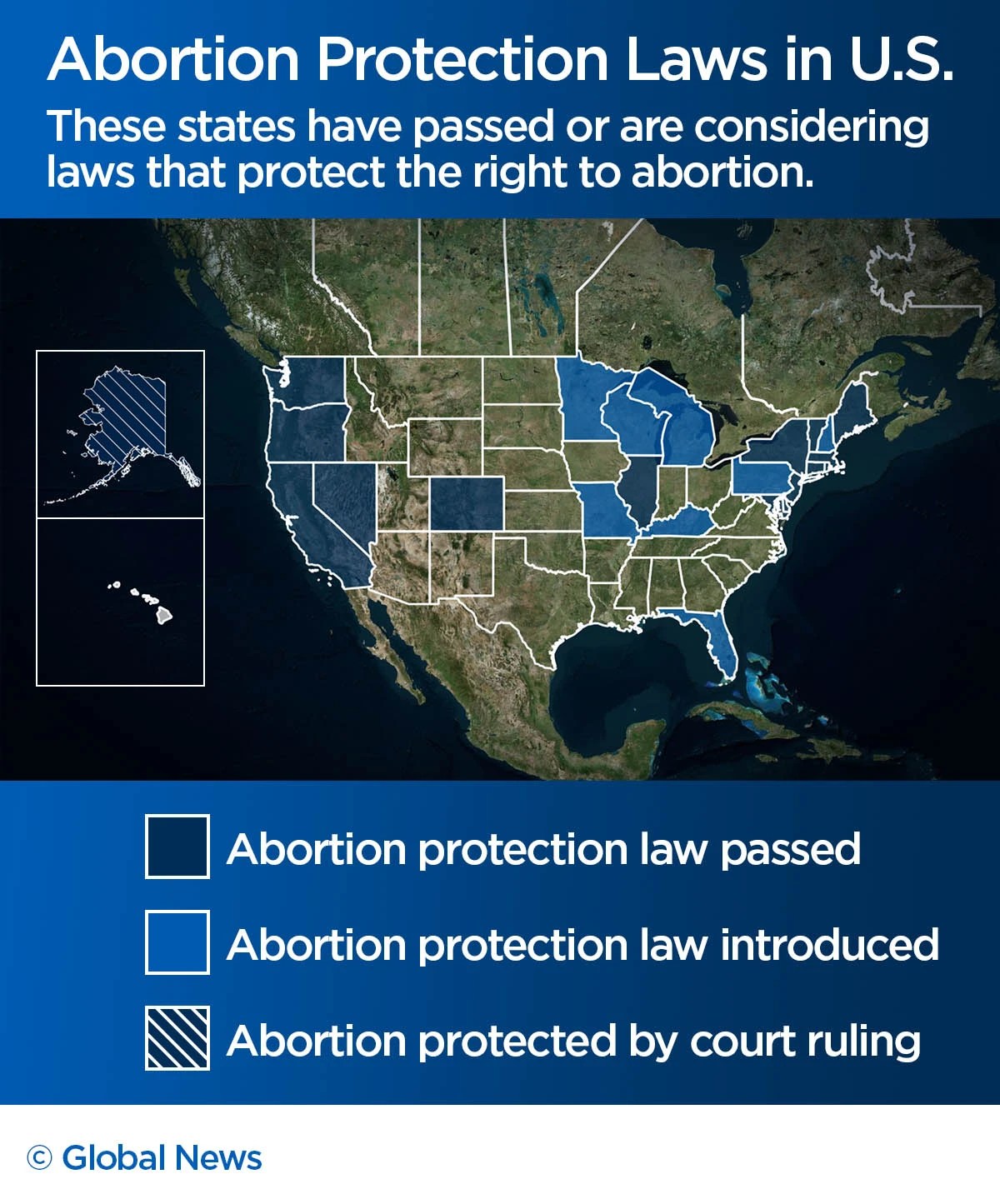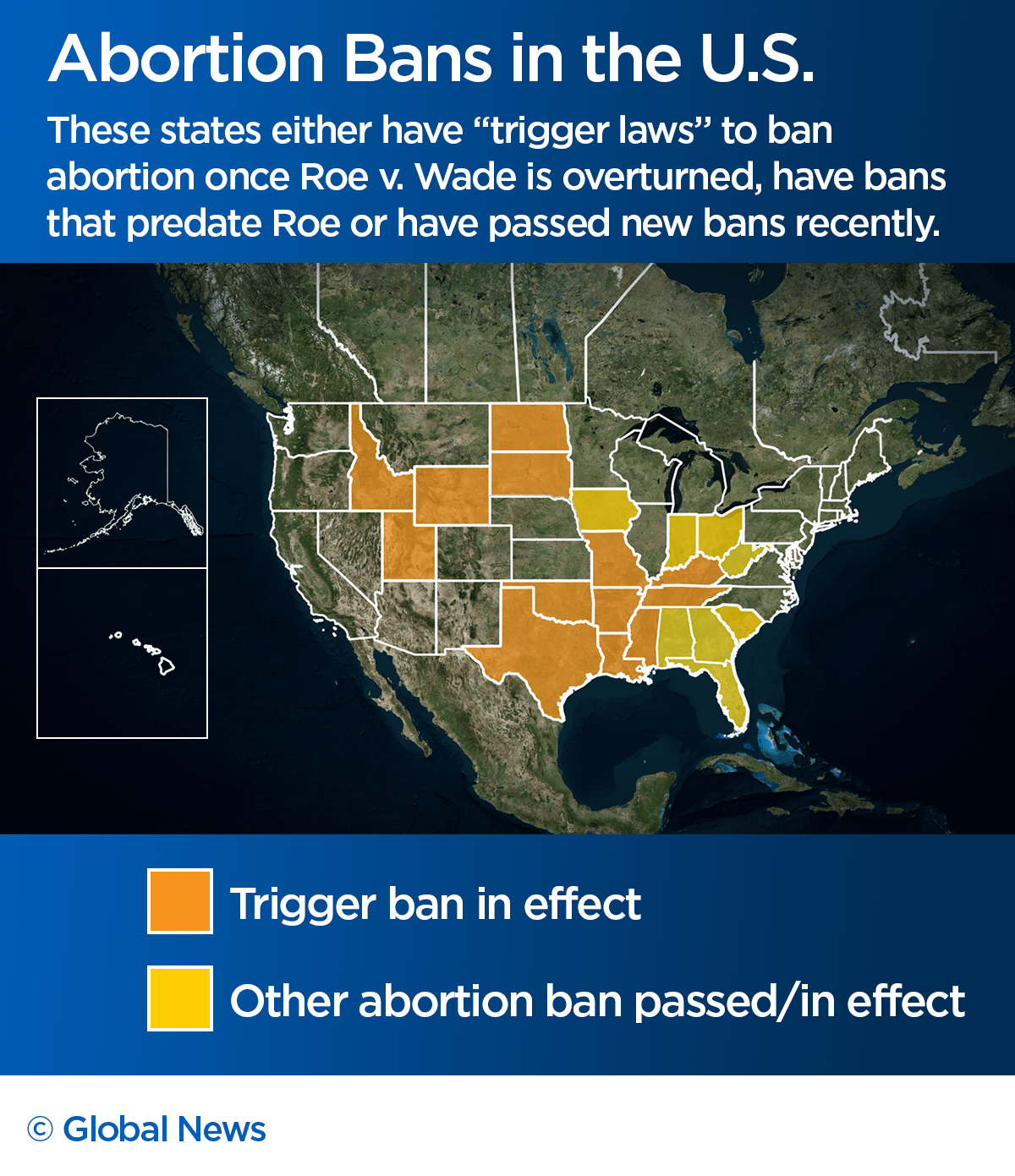Now that the U.S. Supreme Court has ruled to overturn the landmark Roe v. Wade decision that has for decades affirmed the right to abortion, only some states across the country will still protect access.

“The U.S. Supreme Court has taken the radical step of overturning Roe v. Wade outright, thus unleashing uncertainty and harm onto people asking for nothing more than to exercise their fundamental right to bodily autonomy,” Dr. Herminia Palacio, Guttmacher Institute president and CEO said in a statement on June 24, the day of the Supreme Court decision. The institute is a leading research and policy organization committed to the worldwide advancement of sexual and reproductive health and rights.
“This decision comes when the need for abortion is actually growing in the United States,” Palacio said.
A total of 16 states and the District of Columbia have passed some form of legislation that ensures abortion is a protected right under state law.
Abortion policies in Oregon are the most protective, according to the Guttmacher Institute. This is because abortion is not restricted based on gestational age.
- Belarus opposition leader warns of Russia’s threat: ‘We know dictatorship’
- Harvey Weinstein hospitalized after return to jail following rape conviction overturn
- South Africa celebrates 30 years since end of apartheid, but discontent grows
- ‘Hiroshima-level casualties’ feared in final battle for North Darfur
“Abortion is health care, and no matter who you are or where you come from, Oregon doesn’t turn away anymore seeking health care,” Oregon governor Kate Brown said in a joint statement with the governors of California and Washington after the ruling Friday.
“Let me be clear: You cannot ban abortion, you can only ban safe abortions – and this disgraceful Supreme Court decision will undoubtedly put many people’s lives at risk, in addition to stripping away a constitutional right that disproportionately affects women and has been settled law for most of our lifetimes,” Brown added.
In 2015, Brown signed Oregon’s Reproductive Health Equity Act into law. This was a first of its kind bill that codified the right to an abortion into law.
In California, a constitutional amendment was previously introduced to protect the right to an abortion in the state constitution.

“The Supreme Court has made it clear — they want to strip women of their liberty and let Republican states replace it with mandated birth because the right to choose an abortion is not ‘deeply rooted in history,'” said California Governor Gavin Newsom.
“We will not sit on the sidelines and allow patients who seek reproductive care in our states or the doctors that provide that care to be intimidated with criminal prosecution. We refuse to go back and we will fight like hell to protect our rights and our values,” he said.
New Mexico, Vermont and New Jersey also do not restrict abortion based on gestational age. Minnesota and North Carolina are also expected to keep abortion legal.
Other states like Illinois, New York and Maine have protective policies but abortion is banned at fetal viability, which is generally between 24 and 26 weeks of pregnancy.
“Today the Supreme Court rolled back the rights of millions of Americans, disregarding their interests and — more importantly — their lives,” New York Governor Kathy Hochul said online after the ruling.
“Access to abortion is a fundamental human right, and it remains safe, accessible, and legal in New York.”
In states like Colorado, abortion is not restricted based on gestational age. However, state Medicaid abortion care coverage is banned except for in very limited circumstances, according to the Guttmacher Institute.
“I do not think that voting or donating is enough any more. The reality is the GOP has created a non-democracy in our country and we need to come to terms with this and realize that we need to be loud in other ways and have bigger demands,” said Dr. Chloe N. East, a professor at the University of Colorado Denver, online Monday.
“This means finding organizations and people that are doing work to change the system and supporting them in all the ways you can. This does not mean engaging now for a bit and then disengaging until the election.”
“I am grieving the loss of my bodily autonomy and equal rights in the eyes of the government. But I also choose to hope and fight back and I invite you to join me,” East added.
Thirteen states have so-called “trigger-laws” on the books that were written to go into effect when the landmark decision was overturned.
After Friday’s ruling, some of these states did not waste time ensuring these bans were in place.
Clinics in states like Alabama, Kentucky, Missouri, Wisconsin and West Virginia stopped performing abortions after the decision came on Friday.
Reactions
United States President Joe Biden condemned the ruling as taking an “extreme and dangerous path.”
“It’s a sad day for the court and for the country,” Biden said at the White House on Friday. “The court has done what it has never done before: expressly take away a constitutional right that is so fundamental to so many Americans.”
Meanwhile, Missouri governor Mike Parsons said online Sunday that he’s reflecting on the “historic win in our fight for the unborn.”
“We want to thank all the legislators, elected officials, community leaders, and advocates — past and present — who never lost faith in our important mission: protecting life and fighting for the unborn,” he continued.
In Utah on Saturday, Planned Parenthood filed a lawsuit seeking to block the state’s abortion ban.
Utah was included in the number of states that imposed a “trigger law” as soon as the ruling came from the Supreme court.
Under the state’s law, health-care providers face arrest and criminal fines for providing abortion care to patients.
Despite the widespread ban, an Ipsos poll conducted last month for Reuters found that about 71 per cent of Americans — including majorities of Democrats and Republicans — said decisions about terminating a pregnancy should be left to a woman and her doctor, rather than regulated by the government.
However, that support is not absolute: 26 per cent of respondents polled said abortion should be legal in all cases while 10 per cent said it should be illegal in all cases, with the majority supporting some limits.
In 2020, 930,000 abortions were obtained across the U.S., according to the statement. This was the first sustained increase in abortion in nearly three decades.
More than one in three of these abortion were obtained in states that are now certain or likely to ban abortion.

Black women are expected to be disproportionally impacted by the decision.
More Black women live in states that will ban abortion and those living in southern states – with the most restrictive laws – will bear the brunt. For example, Black people make up about 38 per cent of Mississippi’s population, according to recent Census data, compared to about 13 per cent of the U.S. population overall.
The Supreme court’s three liberal justices — Stephen Breyer, Sonia Sotomayor and Elena Kagan — issued a jointly authored dissent after the decision.
“Whatever the exact scope of the coming laws, one result of today’s decision is certain: the curtailment of women’s rights, and of their status as free and equal citizens,” they wrote.
As a result of Friday’s ruling, “from the very moment of fertilization, a woman has no rights to speak of. A state can force her to bring a pregnancy to term, even at the steepest personal and familial costs,” the liberal justices added.
Some companies in the U.S., including Starbucks, Netflix, Uber, Walt Disney Co, and Amazon.com, have started to introduce benefit policies for workers who may need access to abortion services in response to the landmark ruling being overturned.

Scotiabank, the third-largest bank in Canada, also said it will pay for travel costs for American employees in states that restrict abortion access.
According to a June 24 statement from the United Nations Population Fund (UNFPA), nearly half of all pregnancies in the world are unintended. More than 60 per cent of these unintended pregnancies end in abortion.
Of all abortions around the world, 45 per cent are unsafe, according to the UNFPA. This is the leading cause of maternal death.
“Almost all unsafe abortions currently occur in developing countries, and UNFPA fears that more unsafe abortions will occur around the world if access to abortion becomes more restricted,” they said in the statement. “Decisions reversing progress gained have a wider impact on the rights and choices of women and adolescents everywhere.”
— with files from Global News’ Sean Boynton and Reuters






Comments